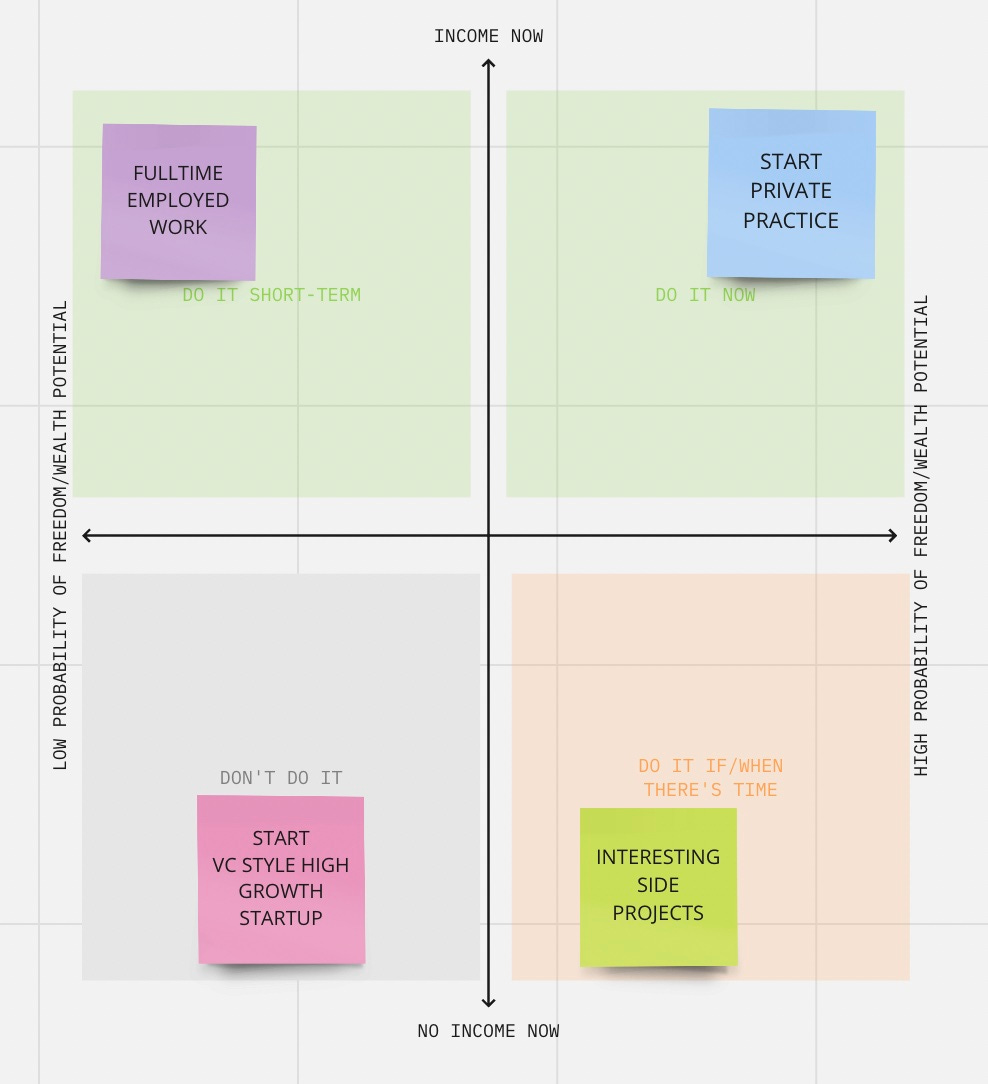"What are you building?"
An inside look at a mid-career physician's career decision making process
For a while whenever I couldn’t come up with something to write on LinkedIn, I’d just post “It’s Tuesday, what are you building?”
These post got a surprising amount of engagement (maybe it should'n’t be that surprising, LinkedIn is literally built for self-promotion). Many people would have these crisp, polished elevator style pitches of a very niche concept.
Then, the other day, a popular angel investor on LinkedIn, called me out my name (with the friendly “@” tag for this purpose), and asked directly and point blank. “Michael, what are you building?”
I didn’t have a clean answer.
From the outside, I should have a crisp and polished answer to this question too.
And sure, I’m more than capable of generating such an answer for any of my various projects that I’ve been pursuing since I left my corporate midlevel medical director role. I’ve gotten pretty good at the elevator pitch over these last few months.
But none of the crisp individual project pitches capture the whole picture, or explain the decision making process for why now, at this stage in my career, I’m choosing to prioritize any one pathway over another
What I’m actually building is a healthcare system innovation studio, and building it off the back of a house calls medical practice. This wasn’t where I started when I left my corporate job, but it’s what makes the most sense for me and my family now.
The vision is we will be a collective of clinicians, technologists, and patient advocates— that create, launch, and then spinout novel micro-systems for how we human being can care for each other’s health. This is similar to the “start-up studios” and “venture studios”, some focused exclusively on healthcare and churning out upwards to 50 healthtech companies a year (!), that are exploding right now in popularity.
Where my vision differs from these venture studios is our relationship to outside Capital. My goal is avoid what is often purported as the way to do business— “grow big and grow fast”. Or as I think of it, doing business with the philosophy of a cancer cell. We will take a middle path, one I’m learning is not as rare as I thought. A friend recently recommended, the book Small Giants. It is opening my eyes to a third path between endless employment and Unicorn chasing, that I think is particularly relevant to physicians.
An exploration of my decision-making process around my next career steps be useful to other clinicians trying to understand the true variety of options before them and how to think about building your own thing.
I’ll start by stating I’m insanely privileged. I’m white, male, heterosexual, raised in upper-middle class communities with some of the best public schools in the country, did a fellowship at an Ivy, and I have a medical license.
My decision matrix around my situation will not apply to the vast majority of people reading this, but for the few who might be able to relate, my goal here is the help my fellow physicians to recognize that you are not as trapped as you may feel you are. The burn-out crisis in our profession has a lot to doing with the lack of creativity around career options that most physicians see for themselves.
Let’s start with my current state of affairs, four months out from a mid-level corporate medical director job at a health insurance company.
By any standards, I am wealthy. I’m not wealthy enough to not need to generate immediate income from my daily work, just yet. I have school age kids, who we’ve finally settled into a schooling situation that works really well for their individual needs, a neighborhood where they have strong friendship, and our family has close engagement with our community. It took us a long time to get to this place, and I’m unwilling to sacrifice any of this for “career satisfaction”.
At the same time, I’m not nearly as desperate to maintain a super high income as many of physician colleagues. If by luck or taste, our family’s lifestyle— while definitely incredibly extravagant by 90% of Americans and 99% of the world’s standards— is relatively modest by comparison to many of my physician and healthcare executive colleagues. I have no debt outside our mortgage, we drive used cars we bought with cash. Our living expenses, including a few nice (but not too extravagant) vacations a year, require less than half of what I was making at my last corporate job and what I could easily command at another. These living expenses are pretty much met by part-time clinical work (which is the current state of affairs in our household).
(My spouse is an artist, and we’ve made the collective decision that her salary doesn’t need to significantly contribute to the family’s income, so we treat my career decisions from the perspective of me being the sole income earner. Her day job does provide health insurance for out family which enables a huge amount of freedom to me in the types of work I can take on and pursue).
All the options before me are good ones. They all have potential to be fulfilling and meaningful work. It doesn’t really matter what I chose next, except if I’m deeply foolish. The purpose of this exercise then, is really just a way for me to identify the least foolish choice for my family and I.
The conclusion I’ve come too may seem odd from the outside, but I think is significant enough to share publicly, particularly with other physicians.
The most foolish thing I could do right now is get another full time job.
With my professional background (and arguably the professional background any clinically oriented physician, if they don’t have massive debt), the most foolish choice I could make right now is one the will make us as a family dependent on the whim of outside institutions and the Capital class that too often controls the decision making at those institutions. In other words, getting another job.
Another foolish thing I could do is dive full-time into building a startup dependent on raising venture capital. In other words, start a “cancer-cell” business.
After careful analysis, the least foolish thing I could do actually is start an independent medical practice. (Because of my peculiar interests and curiosities, I will likely also build other interesting projects on top of this backbone.)
To illustrate these options in this context, I’ve graphed them s on a decision matrix: Income today (protect my family’s current lifestyle) vs. Generate freedom producing wealth for tomorrow (create the freedom for me to increasingly control my time)
I actually have a math equation that relates to this, and includes opportunity cost. (There are some fairly large assumptions in this model, but then again there are in any model about a business decision. My personal experience with all 4 models gives me a reasonable degree of confidence about these assumptions). Reach out if you want to see the math.
An independent primary care practice, that grows slowly, embraces value-based payment models (I’ll address this in a future article), and is primarily focused on financing the best possible care for people in my community that need it most, offers me personally the most opportunity for a sustainable career that won’t burn me out, won’t be subject to random and unpredictable layoffs, and offers the greatest possibility of building sustainable wealth to support my wife and I in our later years, our kids in their schooling, and the chance to build other projects that interest us and contribute to our community.
This is what I’m building.




